- Home
- William Shatner
Spectre Page 4
Spectre Read online
Page 4
"Can you read the ID code?" Picard asked.
"No, sir," Data answered. "There is too much interference . . . too much . . ."
The image on the screen was growing, though it still wasn't detailed enough for Picard to identify. For a few moments, it was almost as if he was seeing the detached saucer hull of another Sovereign-class starship, identical to the Enterprise.
Data spoke again. "Captain . . . I am picking up the transmission now . . . NCC . . . seven . . . four six . . . five six?"
Picard stepped back as if the deck had pitched. The hair on the back of his neck bristled. He had wanted something to happen, but this . . . ?
"My God," Riker said as the ship on the screen at last came into view.
Picard understood the emotion Riker displayed, because he felt it, too.
The ship on the screen appeared in full detail now. The name across her battered hull clear and unmistakable.
Applause started on the bridge, soon followed by cheers.
Picard couldn't blame his crew.
This was truly a moment for celebration.
Five years after being lost with all hands in the Delta Quadrant, the Starship Voyager had at last come home.
THREE
"Captain Kirk, for a man of your astoundingly advanced age, you're lookin' in fine fettle indeed."
Kirk shot his eyes sideways past his glass of iced mint tea, blinked as if what he saw couldn't be real, then opened his mouth in surprise. "Scotty?!"
The familiar face of Chief Engineer Montgomery Scott burst into a wide grin as he saw Kirk's expression. "You were expecting your great-aunt Mabel?"
For a person whose survival had often depended on his ability to talk his way out of an unexpected situation, Kirk was uncharacteristically speechless. He thought he had become fully acclimated to this new era in which he lived. He had grown used to the new wrinkles that creased Spock's taciturn features. He had come to accept McCoy's pure white hair. And he had learned to accept the inevitable loss of a lifetime of friends and family.
But to see Scotty before him, virtually unchanged from the last hour they had been together on the bridge of the Enterprise-B . . . For a moment, Kirk felt dizzy.
It's the gravity, Kirk told himself. After all, this was his first trip back to Earth since he had beamed up to the new Enterprise, with Chekov and Scott, eighty-three years ago. Earth's gravity was slightly stronger than Chal's, so he was still getting used to it. That must be the reason for his sudden feeling of light-headedness. What else could it be?
"Cat got your tongue?" Scott asked, clearly enjoying Kirk's momentary silence.
Then Kirk found his way past his surprise. It no longer mattered that he was on Earth, in the city of Montreal, surrounded by more than a thousand other temporal translocatees who had gathered for this conference. All that mattered was he had found a friend he feared had been lost with so many others.
"Scotty, you . . . look wonderful."
Scott frowned in good-humored disbelief. "Aye, and might I add you don't look a day over one hundred and twenty yerself."
For a few moments, Kirk and Scott stared at each other, each with a glass in hand, both oblivious now to the gala party that swirled around them on the immense antigrav platform that floated through the night. But neither said anything more, as if there were so much to be said that the words had been caught in a monumental systems failure.
Captain Morgan Bateson disrupted the awkward silence. "I would think you two would have more to say to each other," he said. "How long were you shipmates?"
Kirk looked back at the officer to whom he had just been speaking, grateful for his assistance. "Scotty was with me on . . . on my first five-year mission." Kirk shook his head in wonder. How many years, how many light-years had they both traversed to come together in this present moment—a moment neither one would have believed if they had been told about it at their careers' beginning?
"Aye," Scott said pointedly. "The first five-year mission, and every mission thereafter." He stepped forward to offer his hand to Bateson. "Sometimes I suspect the captain has a wee bit o' trouble remembering that."
The tall, bearded captain shook Scott's hand, and as the two men spoke Kirk was surprised to realize that they knew each other, and had even worked together. Bateson was also a Starfleet officer from Kirk's and Scott's era. But where Scotty had deliberately placed himself in a risky transporter loop in order to survive the seventy-five years it had taken to be rescued from his crashed ship, Bateson and his entire crew and starship, the Bozeman, had been trapped for ninety years in a temporal causality loop by accident. Whatever the differences in their journeys, though, both Scott and Bateson wore Starfleet's latest duty uniform, with gray on their shoulders and black for the rest.
Kirk, who wore the simple clothes of a Vulcan traveler, frowned as the greetings ended. "Scotty, that's not true. Where would I be without you?"
The engineer sipped his drink, something green, and gave Kirk a questioning look. "You'd be right here, sir. It's been how long now? More than three years since ye came outta that Nexus whozzit." Scott smiled, but there was a recriminatory undercurrent to it. "And look at you. . . . You never write. You never call."
Kirk understood Scott's exasperation, but there was another side to his complaint, as well. "Scotty, I was . . . busy."
"Aye. I've heard that before."
Kirk saw Bateson's look of amusement, and he suddenly realized that as annoyed as Scott appeared to be, the engineer was pushing the moment for their audience. Kirk and Scott had been through too many adventures together, too many good times—and bad—for the bond between them to be completely severed by the differing demands of their separate careers. At least, Kirk hoped that was the case.
He held up his glass, used it to indicate the holographic banner that floated above the Île Ste-Hélène and the meticulously reconstructed pavilions of Expo '67 they floated past—BIENVENU VOYAGEURS A TRAVERS LE TEMPS / WELCOME TIME TRAVELERS.
"Let's leave the past behind us, Mr. Scott. We're all of us on a journey to the future."
"Some of us faster than others," Bateson added with a smile.
"We should go forward together," Kirk continued. "Not stumble over what's happened in the past." He held out his glass to Scott, hoping the engineer would join him in a toast.
Scott leaned forward and made a show of sniffing Kirk's tea. "That's quite poetic. Have ye been into the Romulan Ale again?"
Kirk frowned at Scott. He was being serious, audience or no. "Mr. Scott . . . ?"
Scott smiled, clinked his glass to Kirk's. "To the future, then. Goodness knows we've made our living from it long enough."
"How about to friendship?" Kirk asked.
Scott winked at him. "That'll be a question for you to answer, sir."
Kirk sighed. Scott wasn't letting him off easy. "After eighty years, Mr. Scott, I think you can forgo the 'sir.' "
A devilish twinkle came to the Scotsman's eyes with that. "Right you are . . . Jimmy!" Then Scott downed the rest of his drink in a single swallow, beaming as Captain Bateson laughed.
Kirk did not join in the fun his two companions appeared to be sharing. He wondered what Teilani was doing that moment. This was the longest he had been apart from her for more than a year.
"I'm sorry," Bateson said, stifling his laughter. "But you two . . . you must have served a long time together."
Kirk nodded.
"Aye," Scott said.
"It's different for me," Bateson continued. "Mostly because Mr. Scott here helped me to accept this new age. And my whole crew came through the loop with me, so I don't feel as isolated in this time. Almost all of us are here tonight."
Kirk followed Bateson's gaze to the milling crowd behind him.
"Did you ever think there'd be so many people pulled from their own eras?" Kirk asked.
" 'Tis a growing concern," Scott said. "Cryoships from the twenty-first century. Colony sleeper ships from the twentysecond. Temporal rifts. W
arp malfunctions." He looked meaningfully at Kirk. "I've heard rumors that Starfleet located another sleeper ship from the Eugenics Wars. Another batch of Khan's supermen, they say. Being 'reeducated' on Alpha Centauri II."
Kirk made no comment, sipped his tea. Those were the problems of this century. They weren't his. Instead, he wondered if Teilani was sleeping. He pictured the way the moonlight always caught her hair in the bed they shared. Once, she had wakened to find him transfixed by that sight, unable to sleep. But she had a way of dealing with that.
But Bateson seemed to have a direct connection to Kirk's thoughts. "It's a common experience, for those of us who've jumped ahead by more than our natural lifetimes, to consider that the challenges of the present day are no longer our concern."
Kirk eyed Bateson attentively. Those words had been far too formal. "Captain, you sound suspiciously like a man who wants to make a point."
Bateson smiled, caught in the act. "Then I'll make it. I have been asked by Fleet Admiral Alynna Nechayev herself, to personally invite you to return to Starfleet."
Kirk wasn't surprised, but Scott nearly spit out a mouthful of ale.
"Ye cannae be serious, lad."
"But I am, Mr. Scott. And so is Starfleet. To use the vernacular of the era in which this World's Fair was first built, Command wants James T. Kirk back in the saddle."
Scott looked puzzled. Kirk knew why.
"Actually," Kirk said, "this World's Fair is from the twentieth century. The 'back in the saddle' is from the nineteenth."
Bateson shrugged. "What's a century among friends? The point is, we can all learn a great deal from the past." He looked out past the railings of the antigrav platform to where a large geodesic sphere passed by them, glittering in the onslaught of dozens of searchlights. Kirk found it odd that a structure whose design was so old could look so familiar—Buckminster Fuller's ancient principles of geodesies were still used to build colony domes throughout the Federation.
"Consider this reconstruction," Bateson said. "The Montreal Historical Society has reproduced in exacting detail a moment in time. Nineteen sixty-seven. Before the first moon landing. One hundred and twenty separate governments taking part in a celebration of the full range of humanity's achievements of the day. Can you imagine? One planet but one hundred and twenty governing bureaucracies? No wonder it was an era of confusion."
Kirk chewed his lip in contemplation. Each moment of this return to Earth had brought new insight into his desire to remain on Chal. Why were so many people so intent on looking to the past? Teilani had been right to make him take this trip—it truly served to make him long for home. "If it was an era of confusion," he said, "then why return to it?" The best days were those to come, Kirk knew. Always.
But Bateson disagreed. "As the great Vulcan philosopher Surak once said, 'Those who do not understand history are condemned to repeat it.' "
"Surak and a dozen others at least," Kirk replied. He scanned the crowd, looking for a server. He'd like another iced tea, though the way Bateson was going on, he'd settle for his first whiskey in almost a century.
"Neural gel packs," Scott said out of nowhere.
Bateson blinked at him. "I beg your pardon."
Kirk saw a tray-bearing woman in a . . . tuxedo. He didn't know from where he had pulled that obscure term, but he knew it was the correct one for the antique black-and-white costume she wore. Yet, though servers in the second half of the twentieth century might very well have worn tuxedos as a uniform, Kirk had his doubts about this server's short, flame red hair. That seemed to be a fashion from another era. She was already heading in his direction and he raised his hand to attract her attention. She nodded. Her smile was quite charming. It made him think of Teilani again.
"Neural gel packs," Scott said again. "Have ye ever heard of them?"
Kirk realized the question had been directed at him. He had no idea what the engineer meant.
"I'm afraid I haven't."
Scott shrugged elaborately. "Och, well, there ye go then."
Now Bateson joined Kirk in waiting for Scott to make whatever point he seemed to be groping toward.
"There I go where?" Kirk asked.
"Well, in your day, it was duotronics. All the computers, most of the equipment, everything had duotronic circuitry at its core,"
"Duotronics I know," Kirk said.
"My point precisely," Scott said. "But what about isolinear chips? What about—" He cleared his throat as if making a grand announcement. "—neural gel packs. They're the new heart of the computers these days. And you, my friend, don't know a thing about them."
Kirk shrugged. "You're right. I don't. At least, I don't think I do."
"Which proves my point. Ye have no intention of returning to Starfleet. Otherwise, ye'd never let things like that slip past you."
Kirk nodded, seeing no need to argue, and no point at all to it. He hadn't read a technical paper in more than a year, and s he was glad of it. The time was right for moving on in his life. Starfleet had shown it could get along without him. His days of action and adventure were finally at an end, and he didn't miss them.
Kirk raised his glass in a toast. "For once, Scotty, we're in perfect agreement."
But with that, Scott suddenly looked concerned. "Hmm. Then p'raps I should reconsider my position."
"Captain Kirk," the server said as she approached him, holding out her tray of drinks.
Kirk smiled at her, finding her husky voice pleasing, wondering how she knew his name. There were more than a thousand attendees at this conference, most of them right here on the antigrav platform that slowly turned to take in the enormous ski-jump-type structure of a glass-covered pavilion. Kirk didn't recognize the hammer-and-sickle design on the pavilion's red flag. Another inconsequential detail lost in the mists of history.
Kirk checked the server's tray, sorry to see there were no teas or Vulcan waters. He shook his head to refuse her offer of a new drink. Then he glanced at Bateson, wondering if he would like to make a selection.
But Bateson's face was creased in concentration as he stared at the woman. "Excuse me, but has anyone ever told you you bear a remarkable resemblance to—"
The phaser beam hit Bateson square in the chest before he could finish.
Kirk stared in confusion as the Starfleet captain stumbled back with a moan. Part of him understood that the beam could only have come from a miniaturized weapon that the server held under her tray. But this was Earth, the safest planet in the Federation. This was the future, an era of peace that Kirk had helped to bring into being. Despite the evidence of his eyes, Kirk's only thought was This isn't happening.
Then the server tossed her tray aside to reveal the small "cricket" phaser she held between thumb and forefinger, and she pushed it up under Kirk's jaw, close enough that even the mildest stun setting could be fatal.
Somehow by accident or excellent placement, the pressure of the phaser seemed to be cutting off the flow of blood to Kirk's neck. He was aware only of the slow fall of his glass of tea as it slipped from his hand, then shattered on the patio floor.
He had some dim perception of the people nearby calling out in alarm, but as his vision narrowed he was aware only of the server pulling close to him and wrapping a well-toned arm around him as she tapped a hidden communicator under her jacket.
"Janeway, here," the server said abruptly. "Two to beam up."
Then Kirk saw Scott and Bateson and the crowd of partygoers dissolve in the sparkle of a transporter beam.
This isn't happening, Kirk told himself uselessly. There was no more room for adventure in his life, and all he could think of was Teilani, and how much he wanted to go home.
But, as always, the universe had other plans for James T. Kirk.
FOUR
On the Enterprise's main viewer, the Starship Voyager slowly rotated, her inertial dampers apparently offline. The sudden elation that had swept Picard and his bridge crew vanished just as quickly, even before Data began reporting th
e results of his sensor scans.
"She is showing a great deal of battle damage, sir. Along with severe structural deformations consistent with passage through an unstable wormhole."
"A wormhole," Picard repeated as he stared at the blackened streaks of weapons' damage to the Voyager's hull. The sight reawakened in him the terrible memories of seeing the battered saucer section of his own Enterprise-D on Veridian III, how he had felt as he had been forced to accept that his ship would never again move among the stars. He did not envy the Voyager's commander now, nor had he when he had read the electrifying announcement that the ship's Emergency Medical Hologram had made contact with Starfleet through a mysterious alien communications array, only two months ago.
The remarkable story the EMH had told, of the Voyager's sudden transit to the Delta Quadrant, the way her captain had combined her crew with the Maquis rebels she had hunted, and how they had since persevered to cross more than ten thousand light-years on their journey home, had become an inspiration to all of Starfleet. And now, to have crossed the remaining sixty thousand light-years in only months, Picard knew he was looking at a ship full of heroes. "Mr. Data, what is the state of the crew?"
"Sensors show total crew complement of . . . thirty-two." Data glanced away from his station. "According to the status report filed by Voyager's EMH, as of two months ago, her crew complement was one hundred and twenty."
Picard became aware of Riker moving forward to stand beside him.
"How are her shields?" Picard asked.
"Twenty-eight percent and fluctuating," Data answered. "Her warp engines are offline. She is running on emergency power. Life-support is functioning only on three of fifteen decks. And I am detecting evidence of inefficient repairs made with alien technology."
"They must have done whatever they had to to survive," Riker said softly, clearly as moved as Picard by the sight of the crippled ship.
Then a tremor made the bridge tilt, and Picard turned to Riker. "I think the first order of business is to remove her from these plasma storms."

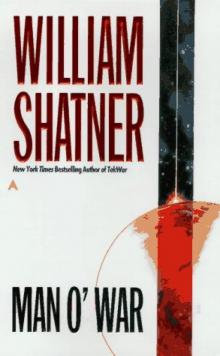 Man O' War
Man O' War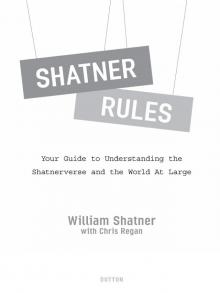 Shatner Rules
Shatner Rules Leonard
Leonard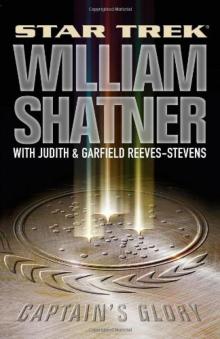 Captain's Glory
Captain's Glory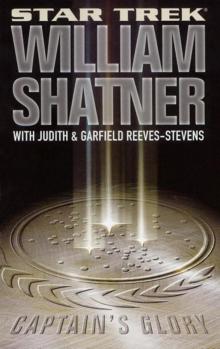 Captain's Glory зпвш-9
Captain's Glory зпвш-9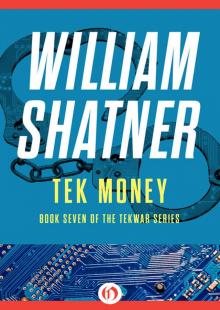 Tek Money
Tek Money Spirit of the Horse
Spirit of the Horse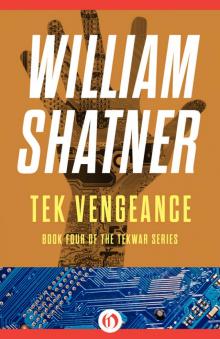 Tek Vengeance
Tek Vengeance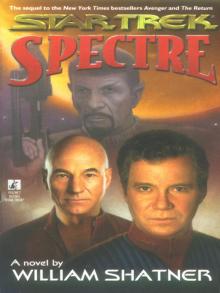 Spectre
Spectre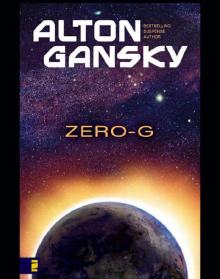 Zero-G
Zero-G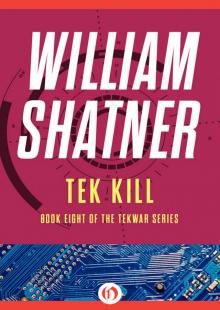 Tek Kill
Tek Kill Collision Course
Collision Course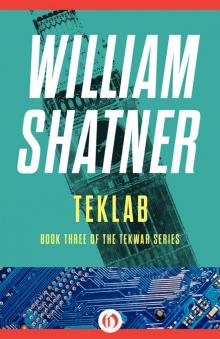 TekLab
TekLab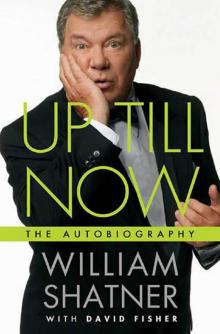 Up Till Now
Up Till Now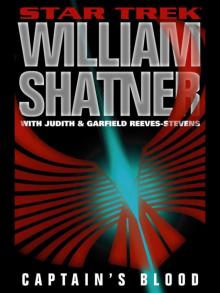 Captain's Blood
Captain's Blood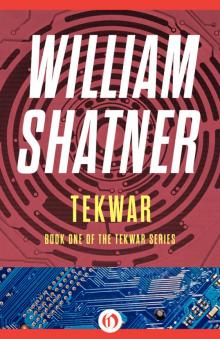 TekWar
TekWar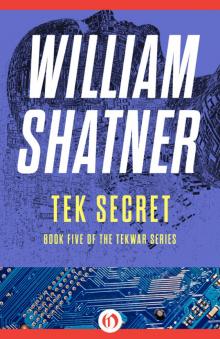 Tek Secret
Tek Secret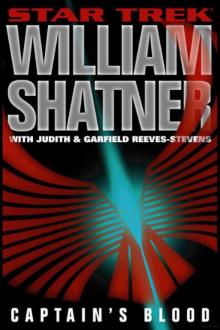 Captain's Blood зпвш-8
Captain's Blood зпвш-8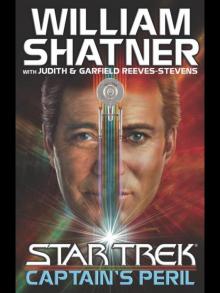 Captain's Peril
Captain's Peril Live Long and . . .
Live Long and . . .